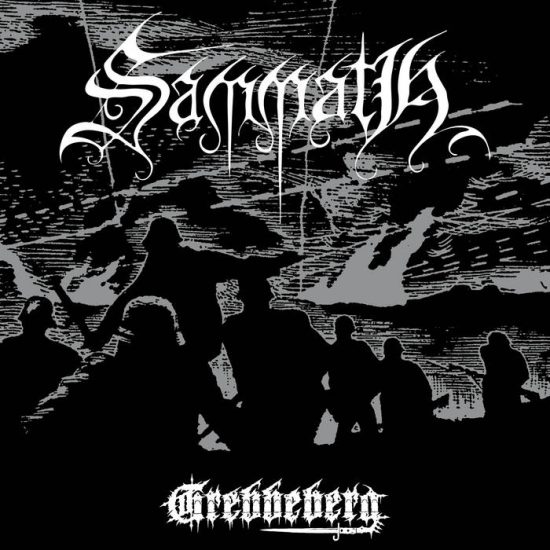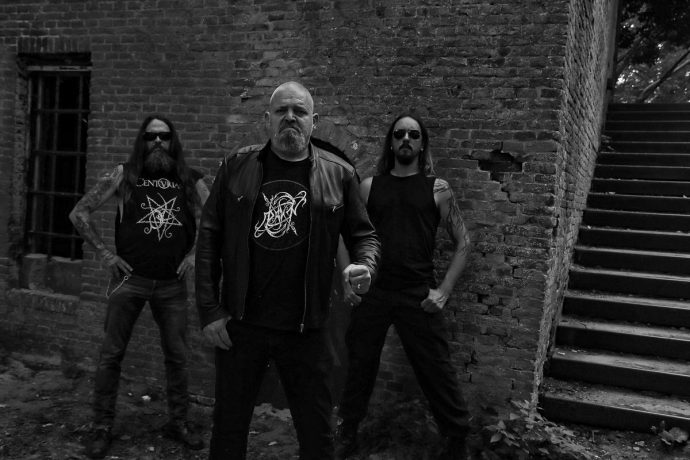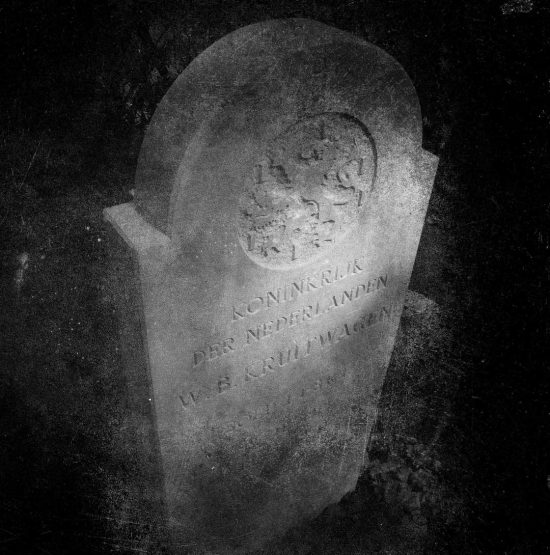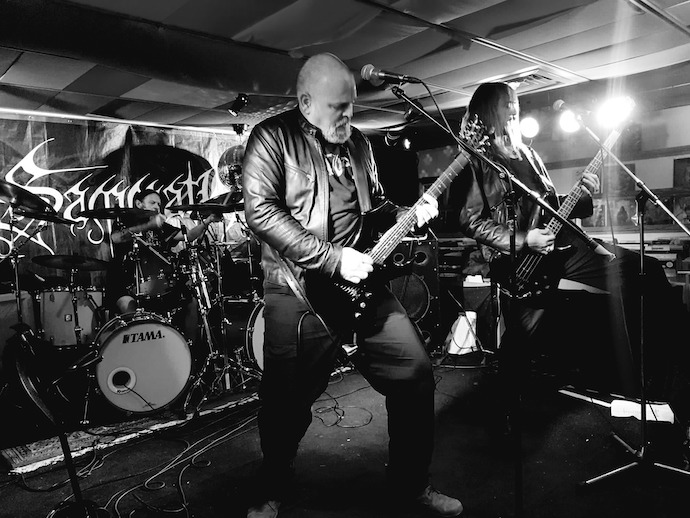
In yesterday’s round-up of new music I mentioned a risk that might imperil today’s column, and the risk became a reality. It’s a minor miracle that it’s here at all, though it’s shorter than I planned and comes much later in the day. In fact, it’s limited to thoughts about a single new album, which I hope you will find worthwhile.
And by the way, Happy Father’s Day to any fathers who happen to drop in here (it’s a U.S. holiday, but the good wishes extend to good fathers everywhere).
SAMMATH (Netherlands)
Sammath are a true rarity — rare in part merely because they have survived for nearly 30 years as a band. As we all know, life expectancy is low for bands in the metal underground, where no one can make a decent living doing it and even minor obstacles thrown up by life can rapidly derail promising futures. But Sammath are an even greater rarity: They haven’t just survived and persisted for such a long stretch of time, but somehow they’ve just released an album that I dare to say is the finest one of their 30-year career.

I really don’t think I’m engaging in hyperbole when I say that about Grebbeberg. To repeat what I wrote after hearing just a few of the album tracks well in advance of the release: “Inspired by the resistance of the Dutch army against Nazi invaders in World War II, and more specifically by the experiences of a relative of mainman Jan Kruitwagen who perished in that conflict, the album is a stunning audio rendition of extreme warfare under the most desperate conditions”. Now, as of Friday, the album is available for everyone to hear.
Warfare in general, as well as specific conflicts drawn from history, have inspired the musical imagination of many metal bands over time, but Grebbeberg pushes the intensity of the subject matter to harrowing extremes that few bands have managed to achieve. The music summons violence, bringing it to life in the music with such ferocity that the effect is breathtaking. But on this new album Sammath never forget the confusion, the fear, the desperation, the pain, and the grievousness of the loss produced by human slaughter, especially on a scale such as that of the second World War. You can’t really hear the music as a glorification of war; it is instead a startling black metal manifestation of all its many terrors.
As mentioned above, the album was inspired in part by (and named for) a specific event that affected the lives of vocalist/guitarist Jan Kruitwagen‘s family. The battle of Grebbeberg was relatively minor in the grand scale of World War II in Europe, an ultimately doomed effort by the Dutch army to slow or stop the advance of the German war machine.
Four hundred and seventeen soldiers lay dead in the battle’s aftermath, among them Kruitwagen‘s great-uncle, who perished at the age of 25. The lyrics of the title track were extracted word for word from the diary of his last moments; the back of the album includes a photograph of his gravestone. The band later discovered that drummer Wim van der Valk’s great uncle also died in the war as a soldier; his gravestone is also included in the album booklet.

However, the album isn’t only about the battle of Grebbeberg. Here, for example, is what Kruitwagen disclosed in a recent interview (here) about the subject matter of other songs, all of which were based on battles that occurred within a 40-minute drive from his home:
“‘Reichswald’, the first single, describes the real life horror story of entering Germany and fighting them on their own soil for the first time in Feb 1945. Relentless bloody war that was, a total slaughter house.
“This first attack was in a huge dense dark forest called the Reichswald, It must have been terrifying to say the least. Heading into a well defended dark forest with murderous artillery raining constantly. Other tracks are also based on different battles or moments a soldier experiences in the horror of war in the Rhineland.”
But again, it’s worth emphasizing that the hair-raising intensity of the music make it a realization that seems far greater, far more expansive, than any single episode of violence, fear, and death. How did Sammath pull this off? Well, take as an example that song “Reichswald” discussed above. It was the album’s explosive first single. As I wrote when I first heard it:
The screams and roars channel madness and pain. The drums sound like high-powered munitions, the weaponry firing until too hot to touch. The fast, white-hot riffing sears, encompassing sensations of brutality, delirium, and paralyzing fear. The music soars and sweeps toward epic heights in ways that manifest the vast turmoil and terrors of combat on a terrible scale, but also descends into the dismal muck of degradation and hopelessness.
That’s one startling example of “how Sammath pulled this off” — through the union of Wim van der Valk‘s highly accelerated percussive obliteration, the earth-shaking thunder of Ruud Nillesen‘s bass performances, and the violence of Kruitwagen‘s super-heated riffing and unhinged vocals, coupled with morphing melodies that capture the many ways in which violence victimizes combatants.

Sammath do this again and again. They create vortices of fire and fury, experiences of raw, ravaging, and brutalizing mayhem, sometimes given added authenticity through the interweaving of recordings of actual militarized conflict (see especially “Murderous Artillery” and the interlude in “Crushed, Shattered and Destroyed“). It’s undeniably exhilarating to hear that, to experience the machine-gun drumwork and its megaton percussive detonations, the gut-bruising and bone-smashing impact of the bass discharges, the rapidly roiling, writhing, and brazenly blazing guitar-work, and the throat-ripping screams.
But what they also do again and again is to infiltrate the chaos with melodic qualities that make these musical manifestations of total war about much more than black metal versions of mechanized weaponry. You can sense in the music that there are human beings who not only perpetrate the devastation but also become mad in their efforts to survive and who suffer from it in the worst ways imaginable.
And over and over again, Sammath magnify the music’s scale, creating sweeping panoramas of grim cruelty and hopeless agony; it’s hard to single out only one example of this, but “Crushed, Shattered and Destroyed” certainly belongs in that group.
There aren’t many times on Grebbeberg when Sammath draw back from the violence, but when they do it’s not to avert their gaze from the horror or to provide comfort. The slow, opening of “Last Gasp of the Dying” moans, groans, and crushes the soul. Even when the power and speed of the music in that song magnify, it still sounds emotionally devastating. The music seems to wail in anguish, even in the midst of strafing runs; it might be the most doomed and desolating track on the record.
The opening phase of the closer “Stahl und Feuer” is the other most noticeable place where the band pull back a bit. War does eventually rage in that song, but it’s also the album track that sounds most deeply saturated by heartbreak and grief, or at least it gives “Last Gasp of the Dying” strong competition for that mark.
One trepidation that comes from listening to an album that reaches such extravagant heights of success in what the band set out to do is to wonder, what the hell are Sammath going to do next? How do they top this? Or will they take a different turn in their path? I have no idea. But it’s damned obvious that 30 years haven’t quenched their creative fires — long may they burn.
Grebbeberg was released by Hammerheart Records on June 16th, and it’s available on CD, LP, MC, and digital formats. I’ve also included the full YouTube stream below.
https://sammath.lnk.to/grebbeberg
https://sammathhhr.bandcamp.com/album/grebbeberg
https://www.sammath.nl
https://www.facebook.com/sammath666
